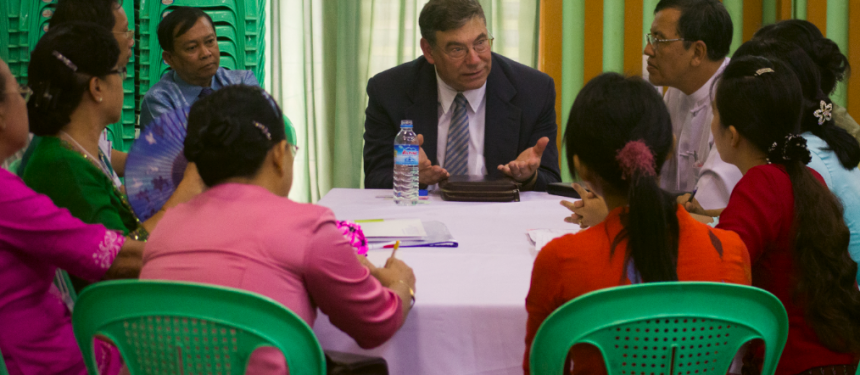Last week representatives from Burmese universities and the US and Burmese governments met in Yangon for the last in a series of international engagement workshops. Organised by the Institute of International Education (IIE), the event is one of many international partnerships in higher education that Burma – officially the Republic of Myanmar – is seeking to provide key funding and training opportunities.
News and business analysis for Professionals in International Education
Have some pie!
International partnerships open up in Burma
 Delegates at IIE's workshop in Yangon. Photo: Jennifer Eisele.
Delegates at IIE's workshop in Yangon. Photo: Jennifer Eisele. The country’s higher education system is in a state of major transition following the dissolution of the military junta in 2011, so one key element of the international engagement pilot course, Connecting with the World: International Relations at Higher Education Institutions, is a newly forged network to foster collaboration globally and within the local higher education system.
“This cooperation and networking will be essential as [universities] adapt their structures, governance, and processes to reflect changing needs and increased independence,” Clare Banks, Senior Manager for IIE’s Center for International Partnerships in Higher Education, told The PIE News.
Success during this transition phase “will depend on connecting with other countries, and engaging in collaborative research and teaching activities,” said Banks.
“Universities will need to be prepared to take on an increasingly important role in developing Myanmar’s human resources capacity,” she commented.
“Cooperation will be essential as universities adapt their structures, governance, and processes to reflect changing needs and increased independence”
A lack of funding is one of the challenges Burmese institutions face when forging partnerships, as well as a “deeply hierarchical” university culture and a lack of understanding of what they can bring to a partnership, Banks explained.
With this in mind, IIE’s training provided “a platform through which the participants… were empowered to take on this new role and were tasked with thinking about international strategy as it relates to the goals of the institution,” she said.
IIE is currently exploring private sector alliances to finance the pilot programme’s expansion in Burma and other countries, as well as exploring how best to meet additional training needs in Burma.
Meanwhile, Burma’s participation in a new credit transfer system that has been dubbed the ‘Asian Erasmus’ will ensure greater harmonisation within the region, as will a Japan International Cooperation Agency (JICA) initiative to strengthen engineering education at Yangon Technological University and Mandalay Technological University.
The five-year, government-backed Project for Enhancement of Engineering Higher Education will supply foreign educators and enable Burmese educators to complete doctorates and short-term training at seven participating Japanese universities.
Other cross border initiatives include a £4.2m British Council and UK DFID (Department for International Development) to provide native English teacher trainers to 21 of Burma’s training colleges.
“The influx of expatriate families into the country is expected to drive demand growth for high-quality international education”
In addition to academic partnerships, an increase in foreign investment has led to a number of international schools establishing branch campuses in Burma.
The British International School will open a $20,000-per-year institution in August following the English National Curriculum, which will eventually accommodate more than 1000 students.
“As the need for school places from multi-nationals and diplomatic missions mounts, our initial priority has been to open our first campus as quickly as possible,” Stewart Fry, Chairman of the British Schools Foundation, said at a reception at the British Ambassador’s Residence in Yangon. “Further down the line as the country continues to develop we will be looking at needs in other cities.”
Around 3,200 of Burma’s 8.5 million school-aged children currently attend five premium international schools.
Yoma Strategic Holdings, which will open an international school with UK-based Harrow International Management Services and Dulwich College International and a private local school with a domestic provider in Thanlyin Township this year, commented: “The influx of expatriate families into the country is expected to drive demand growth for high-quality international education while supply is currently limited.”
Still looking? Find by category:



7 Responses to International partnerships open up in Burma